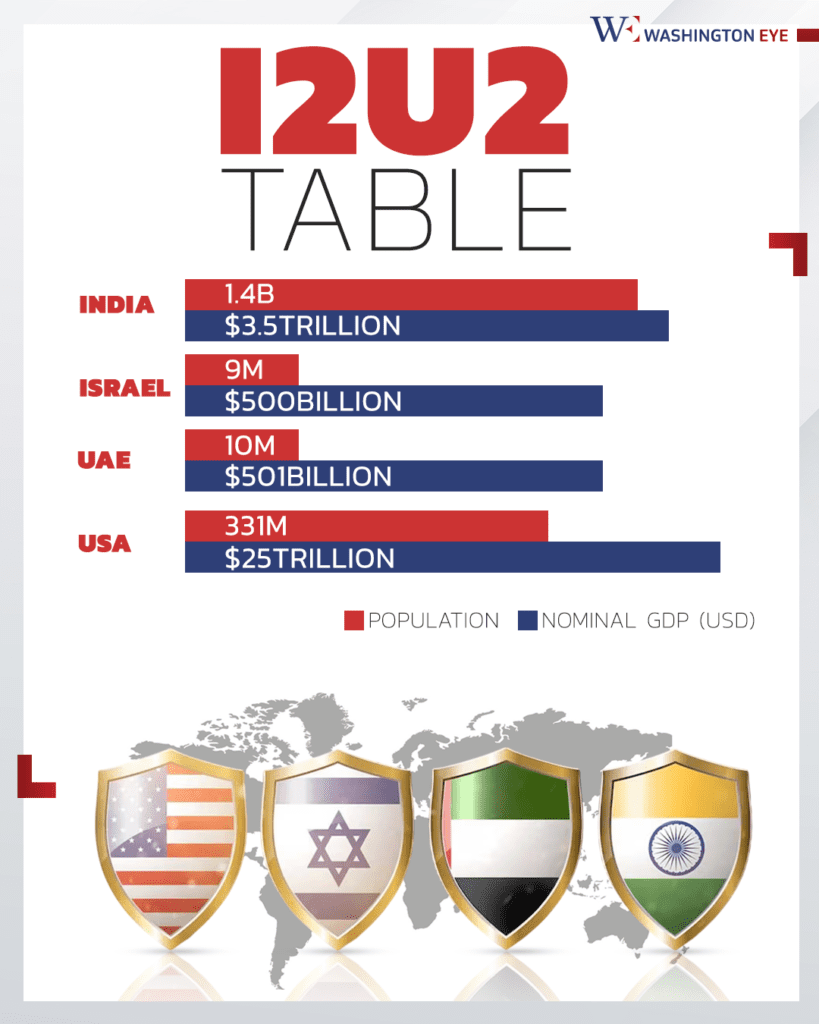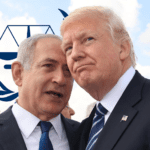Israel: The Focal Point Amidst Conflict
Israel, a key member of the I2U2 alliance, faces significant challenges due to ongoing conflicts, which impact its economy, security, and overall stability. The Israeli-Palestinian conflict, in particular, has deeply influenced the nation’s policies and priorities.
Economically, the defense budget diverts resources from other sectors like infrastructure, education, and healthcare. Nevertheless, Israel has managed to develop a strong economy, often referred to as the “Start-Up Nation” for its innovation and tech startups. The I2U2 alliance can further bolster Israel’s economy by promoting collaboration in technology, energy, and water resources.
Security is a paramount concern for Israel, necessitating a strong military presence and advanced defense systems like the Iron Dome. The I2U2 alliance offers a platform for Israel to collaborate on security and defense with like-minded nations, enhancing regional stability.
Diplomatically, Israel has made significant strides in normalizing relations with its neighbors, exemplified by the Abraham Accords with the UAE and Bahrain. The I2U2 alliance builds on these efforts, providing a framework for Israel to engage with global players like the United States and India, leading to joint projects in renewable energy, healthcare, and technology.
Israel’s technological prowess is recognized globally, with advancements in medical technology, agriculture, and water management. The I2U2 alliance presents an opportunity for Israel to share its expertise, driving collective progress in critical fields.
Socially, Israel’s diverse population brings both strengths and challenges. Participation in the I2U2 alliance can foster greater cultural understanding and exchange, promoting mutual respect among member nations.
Israel’s ability to navigate complex challenges and leverage its strengths makes it a valuable partner within the I2U2 alliance. By focusing on economic, security, diplomatic, technological, and social dimensions, Israel can play a crucial role in shaping the future of the alliance.
The I2U2 alliance represents a beacon of hope for a collaborative and pragmatic approach to global challenges. With the right leadership and strategic moves, this alliance has the potential to rise from the ashes, ready to tackle the world’s challenges head-on. Israel’s participation and commitment are key to realizing this vision, fostering a brighter and more cooperative future for all member nations.
Trump’s Return: A Businessman’s Approach
Enter Donald Trump, the businessman-turned-president, back in the Oval Office. Known for his focus on national self-interest, Trump has already made headlines with his recent move to return Indian illegal immigrants from the US. This move, while controversial, underscores his commitment to prioritizing American interests.
In the days following his inauguration, Trump has been busy signing executive orders and making significant policy changes. Among his first actions, he declared a national emergency at the southern border, banned birthright citizenship, and delayed the TikTok ban. These moves are part of his broader strategy to reshape America’s immigration policies and reinforce his administration’s focus on national security.
Trump’s recent interactions with Israel and the UAE have also been noteworthy. His meeting with Israeli Prime Minister Benjamin Netanyahu was crucial for the future of Gaza and the Middle East. Trump’s re-election and his threat that “all hell will break loose” helped secure a ceasefire deal in Gaza. Netanyahu’s visit to the US to discuss the ceasefire and other regional issues underscores the importance of the US-Israel relationship.
In addition to his dealings with Israel, Trump has also engaged with the UAE. His administration has been working closely with UAE President His Highness Sheikh Mohamed Bin Zayed Al Nahyan to strengthen bilateral ties. The UAE’s strategic importance in the region, coupled with its growing influence in global markets, makes it a valuable partner for the US. Trump’s pragmatic approach to foreign policy could bring a renewed focus on economic and strategic partnerships, benefiting both the US and its I2U2 partners.
Given his track record, it’s not far-fetched to believe that Trump could leverage the I2U2 alliance to strengthen ties with key allies and boost economic cooperation. The I2U2 alliance, comprising India, Israel, the United States, and the United Arab Emirates, aims to foster cooperation in areas such as water, energy, transportation, space, health, and food security. Trump’s pragmatic approach to foreign policy could bring a renewed focus on economic and strategic partnerships, benefiting both the US and its I2U2 partners.
Trump’s recent interactions with world leaders, including a phone call with Indian Prime Minister Narendra Modi, highlight his commitment to maintaining strong bilateral relationships. Modi congratulated Trump on his “historic second term” and expressed a desire to work together for global peace, prosperity, and security. This renewed partnership could pave the way for joint initiatives under the I2U2 framework, such as the development of integrated food parks in India and hybrid renewable energy projects.
Trump’s return to the White House brings a business-minded approach to governance, with a focus on national self-interest and strategic partnerships. His administration’s actions and policies, both domestically and internationally, reflect his commitment to reshaping America’s role on the global stage and fostering economic cooperation with key allies.
India’s Role: From Abraham Accords to Strategic Partnerships
India’s involvement in the I2U2 alliance came after the historic Abraham Accords, which normalized relations between Israel and the UAE. This strategic partnership has been instrumental in fostering cooperation in areas such as water, energy, transportation, space, health, and food security. With its growing economy and technological prowess, India is a valuable partner in addressing global challenges.
India’s fintech sector is booming, with the Unified Payments Interface (UPI) leading the way in digital financial innovation. The country’s emphasis on digital transformation and technological advancement aligns perfectly with the objectives of the I2U2 alliance. These advancements not only bolster India’s economy but also provide opportunities for collaboration with alliance members in developing cutting-edge solutions to global issues.
Recently, India and the UAE have strengthened their bilateral ties within the I2U2 framework, focusing on sectors like food processing and renewable energy projects. These agreements are expected to enhance cooperation and contribute to regional stability and development. India’s commitment to sustainable energy and its expertise in agriculture technology make it a critical player in these initiatives.
Despite challenges such as trade tariffs and immigration policies that could strain relations—like the return of Indian illegal immigrants from the US—there is potential for a pragmatic approach that benefits all nations involved. With leadership focused on economic pragmatism, there’s hope for continued collaboration and mutual growth within the alliance.
India’s strategic importance cannot be overstated. Its ability to navigate complex geopolitical landscapes and its emphasis on multilateral cooperation make it a cornerstone of the I2U2 alliance. By leveraging its relationships and technological strengths, India can help drive the alliance forward, fostering innovation and addressing pressing global challenges.
The collective efforts within the I2U2 alliance, especially as more countries consider normalizing ties with Israel, could lead to an expanded and more robust network for collaboration. India’s role will be pivotal in this potential expansion, offering expertise, resources, and a unique perspective that bridges different regions and cultures.
UAE’s Calculated Moves: Global Expansion with a Strategic Twist
The UAE, a significant player in the Middle East, has consistently showcased its ambition and strategic prowess. Known for its rapid modernization and economic diversification, the UAE has made remarkable strides in various sectors, positioning itself as a global hub for trade, tourism, finance, and innovation. Its strategic location at the crossroads of Europe, Asia, and Africa enhances its importance as a key player in regional and global affairs.
The UAE’s achievements in the region are manifold. Economically, the UAE boasts one of the most diversified economies in the Gulf Cooperation Council (GCC), with significant investments in infrastructure, technology, renewable energy, and tourism. The establishment of world-class financial centers, such as the Dubai International Financial Centre (DIFC) and the Abu Dhabi Global Market (ADGM), underscores the UAE’s role as a financial powerhouse. Additionally, the UAE’s airlines, Emirates and Etihad, have set benchmarks for excellence in the aviation industry, further solidifying its global connectivity.
In the realm of diplomacy, the UAE has played a crucial role in fostering regional stability and cooperation. The signing of the Abraham Accords, which normalized relations with Israel, marked a historic milestone in Middle Eastern diplomacy. This agreement opened new avenues for economic collaboration, cultural exchange, and political dialogue, underscoring the UAE’s commitment to peace and prosperity in the region.
The UAE’s strategic importance is further highlighted by its investments in renewable energy and sustainability. The country has launched ambitious projects such as Masdar City, a sustainable urban development initiative, and has committed to significant investments in solar energy. These efforts align with global sustainability goals and position the UAE as a leader in the transition to a low-carbon economy.
The I2U2 alliance, comprising India, Israel, the United States, and the United Arab Emirates, presents a unique opportunity for the UAE to further its economic and geopolitical objectives. By leveraging the strengths and expertise of its partners, the UAE can enhance its position as a regional leader and global innovator. The alliance aims to foster cooperation in critical areas such as water, energy, transportation, space, health, and food security. The UAE’s strategic investments in these sectors make it a valuable partner in the I2U2 alliance.
The UAE’s participation in the I2U2 alliance can drive collaborative projects that address pressing global challenges. For instance, joint initiatives in renewable energy can harness the UAE’s expertise in solar power and align with its sustainability goals. Similarly, collaborations in healthcare and technology can benefit from the UAE’s advanced infrastructure and innovation ecosystem.
By actively engaging in the I2U2 alliance, the UAE can strengthen its ties with key global players and reinforce its commitment to multilateral cooperation. This strategic partnership not only enhances the UAE’s influence in the region but also contributes to the collective goals of the alliance members. The UAE’s calculated approach to global expansion, coupled with its achievements and ambitions, makes it a cornerstone of the I2U2 alliance.
The Future of I2U2: A Glimmer of Hope
Despite the current pause, there’s a strong belief that the I2U2 alliance has a future. Trump’s return to office brings a unique opportunity to leverage his business mindset and focus on national interests to revive the alliance. The potential for allies to count on each other and address global challenges is immense. The I2U2 alliance, with its focus on economic pragmatism and multilateral cooperation, stands as a beacon of hope for a collaborative future.
The recent developments in Gaza, with American influence playing a key role, indicate a shifting landscape in the region. This change could encourage more countries to normalize ties, recognizing the strategic and economic benefits of joining the alliance. By aligning their interests with the United States and other I2U2 members, these nations can enhance their own stability and prosperity.
The UAE’s active participation in the alliance, coupled with its achievements and ambitions, further strengthens the alliance’s potential. The UAE’s strategic investments in renewable energy, technology, and infrastructure make it a valuable partner in addressing global challenges. Collaborative projects within the I2U2 framework can drive innovation and sustainable development, benefiting all member nations.
India’s growing economy and technological prowess also play a crucial role in the alliance. By fostering cooperation in sectors like fintech, agriculture technology, and renewable energy, India can contribute significantly to the I2U2’s objectives. The collaboration between India and the UAE, particularly in food processing and renewable energy projects, showcases the potential for successful joint initiatives.
The collective efforts of the I2U2 alliance members can turn a perceived setback into a great success. As more countries in the region consider normalizing ties with Israel and engaging with the alliance, the potential for economic growth and regional stability increases. The alliance’s focus on pragmatic solutions and multilateral cooperation can address pressing global challenges, paving the way for a brighter future.
In this evolving landscape, the I2U2 alliance has the potential to rise from the ashes, ready to tackle the world’s challenges head-on. With the right leadership and strategic moves, the alliance can transform into a powerful force for global cooperation and economic prosperity. The renewed interest and participation of member nations can turn this vision into reality, ensuring a successful and impactful alliance.
















